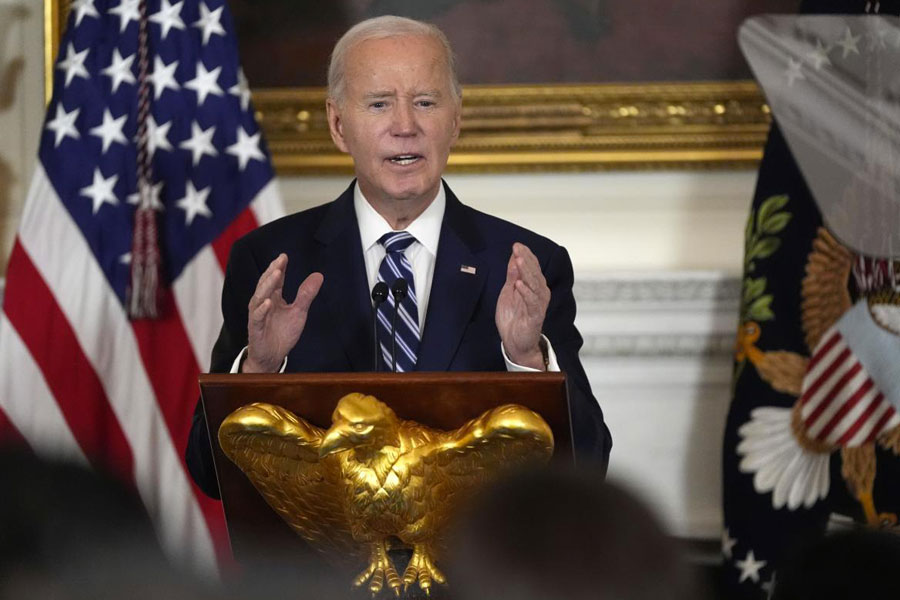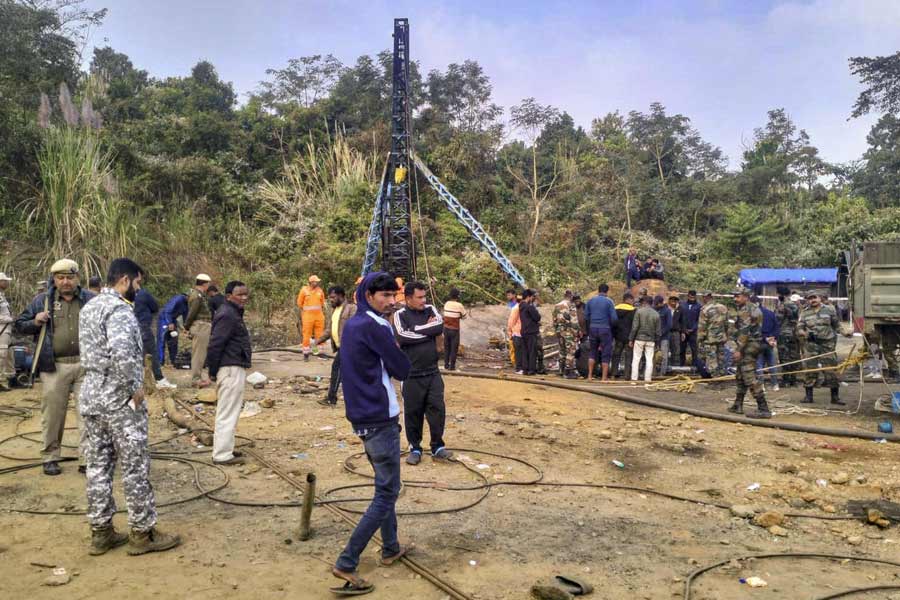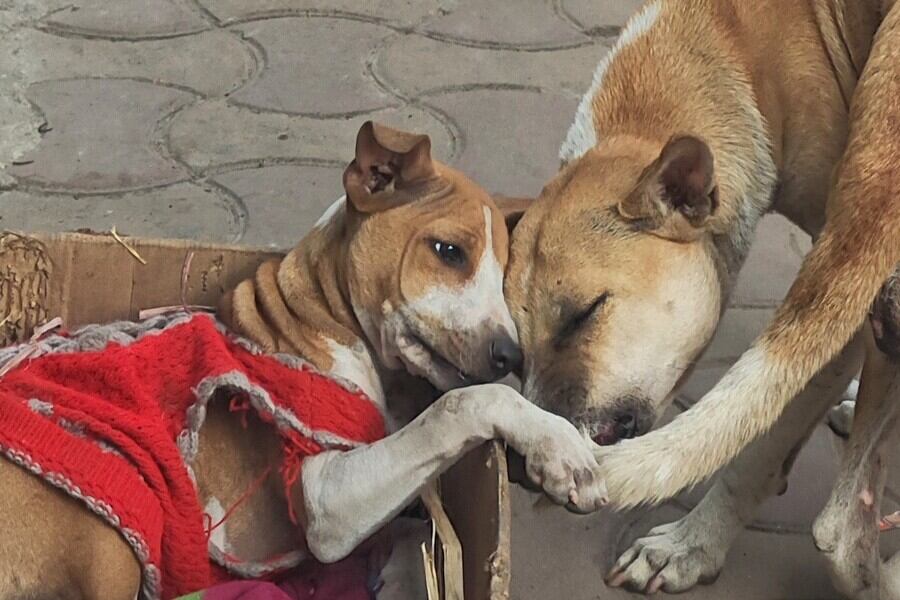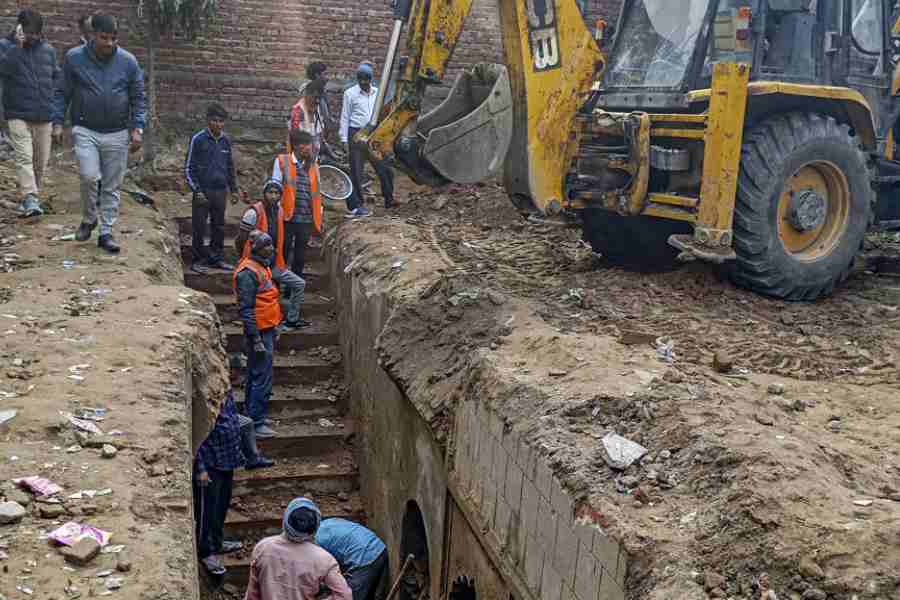Barricades, checkpoints, shut Metro stations, mobile service restrictions, quick arrests — Delhi police pulled out the stops on Thursday to prevent protests against the amended citizenship law anywhere barring Jantar Mantar.
Still, hundreds did flood the streets and many of them managed to hold demonstrations, such as at Parda Bagh near the heavily barricaded Red Fort.
M. Yakub, who sells perfume near the Nizamuddin dargah, had first gone to the Red Fort with his two friends to protest but after the police banned assemblies there, came to Jantar Mantar.
Pointing towards the hundreds there, he told The Telegraph: “Muslims are feeling very scared after this new citizenship law. But I’m feeling very happy here…. The majority in the crowd are Hindus and they are protesting for our rights. Look at this crowd, this is the idea of India we are fighting for.”
Hundreds of others had turned up at various protest venues to be detained immediately. Mobile connectivity had been turned off in large parts of the capital and 16 key Metro stations had been shut.
The highway to Gurgaon was lined with barricades where the police checked for protesters, creating a massive traffic jam. Similar checking was done on several central Delhi roads.
Outside the Red Fort, from where a march called by more than 60 organisations was to head for Shaheedi Park, almost the entire Netaji Subhash Road was swathed in barricades and checkpoints.
The police had denied permission for the march on Wednesday and imposed prohibitory orders around the fort on Thursday.
Anyone suspected of being a protester was told to walk away or face arrest. Those who made it to the fort’s entrance were immediately whisked away. Prohibitory orders were also imposed in northeast Delhi and most of the New Delhi districts.
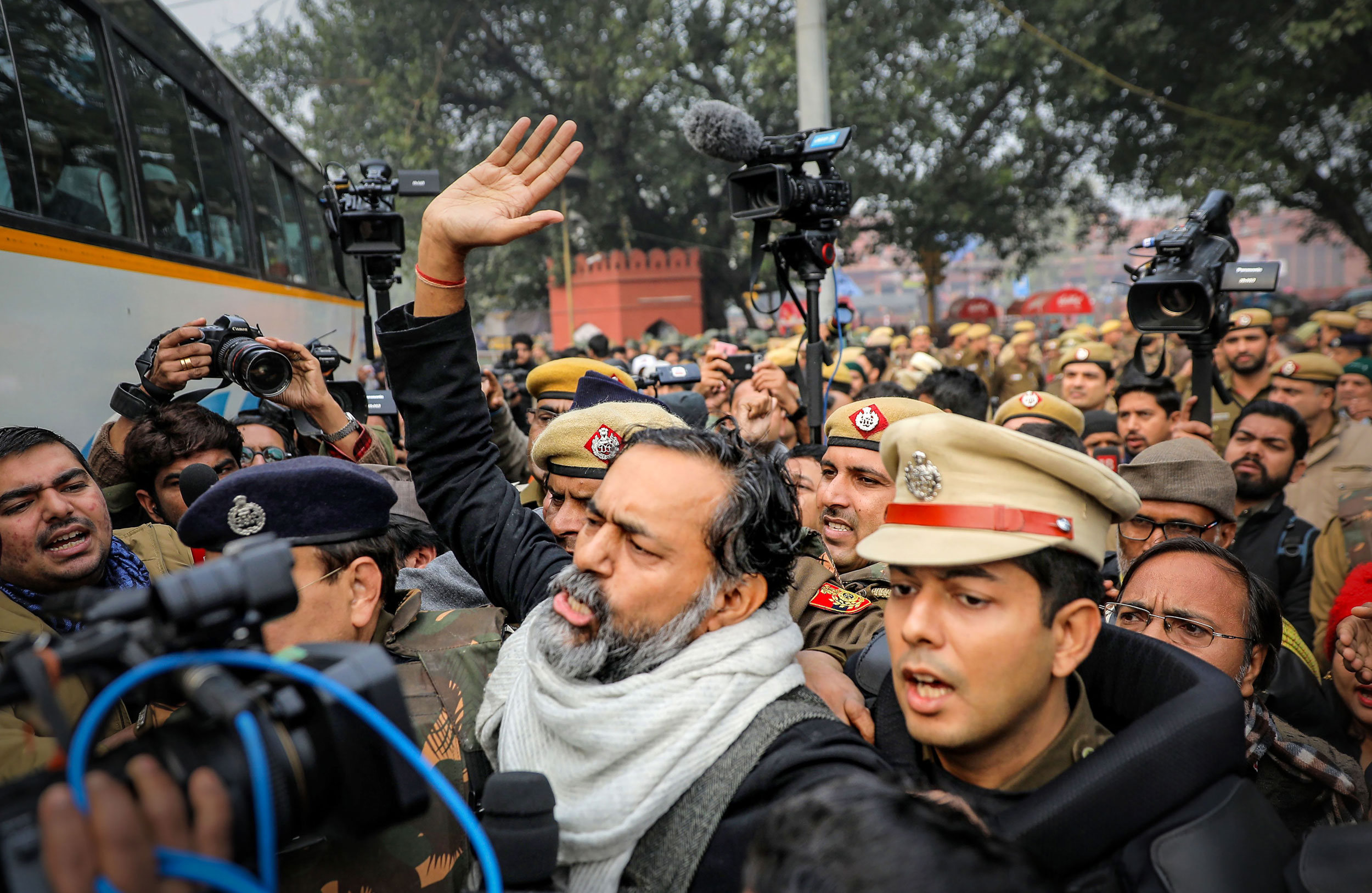
Yogendra Yadav is detained by police during an anti-Citizenship Act protest at Red Fort in New Delhi on Thursday. “The Constitution is greater than this (amended citizenship) law,” Yadav said. (PTI)
The detentions at the Red Fort began at 11am, half an hour before the march was to start. One of the organisers, Yogendra Yadav, told the protesters not to confront the police as he was pushed into one of the many vehicles waiting to transport the detainees.
“The Constitution is greater than this (amended citizenship) law,” Yadav said.
Many others, including former MP Dharam Vira Gandhi, CPIML Liberation’s Sucheta De, Congress politician Ishrat Jahan, and rights activists Umar Khalid and Nadeem Khan were similarly whisked away.
Khalid and Khan had taken the police by surprise by entering through Chandni Chowk and chanting “Inquilab zindabad” right in front of the Red Fort.
“A nation whose Prime Minister can’t show his degree can’t disqualify people as non-citizens for not having papers. Citizenship can never be based on religion,” Khalid said before being dragged away.
In all, 126 people detained near the fort were sent to police stations and stadiums in outer Delhi.
The Left march scheduled from Mandi House witnessed a similar clampdown. Among those picked up were CPM general secretary Sitaram Yechury, CPI general secretary D. Raja and CPM leaders Brinda Karat, Prakash Karat, Nilotpal Basu, Hannan Mollah and Pallab Sengupta.
So were former chief minister Sheila Dikshit’s children --- former MP Sandeep Dikshit and Latika Dikshit ---- and granddaughter Afiya. Congress leader Ajay Maken’s wife Radhika and son Aujaswi too were dragged into a bus while the latter was talking to a TV channel.
Congress activist Varun Santhosh, detained with them at Mandir Marg police station, told this newspaper after being released: “The others and I were explaining to people they should not stand in groups of more than four as it gave the police an excuse to arrest them. I saw an officer drag away a boy who was standing alone silently, without a placard. When I walked up to him and asked what law he was making the arrest under, I was also detained.”
Although the Dikshits and Makens did not mention their names, the police soon figured out who they were. They were kept in detention for four hours.
“The police chased us along the lanes around Mandi House like mice,” Anindita Adhikari, a protester, told this newspaper.
“Finally, when around 30 of us found ourselves near Bengali Sweet House, we raised our placards and began sloganeering. Almost immediately a police motorcycle came, siren wailing, and we had to disperse.”
At Parda Bagh, groups of mainly Muslim protesters who had marched all the way from east Delhi joined local people to stage a six-hour dharna on Nishadraj Marg, lined by homes of mainly Hindu families from Pakistan who had been resettled after Partition.
The protesters were unanimous about who their hero was — a Sikh man who works for a government agency, because he had come despite not being affected by the citizenship amendment.
“We understand that (Assembly) elections are close and (Narendra) Modi needs to do Hindu-Muslim (polarisation),” Mozam Khan, an air-conditioning technician from Laxmi Nagar, said.
“The Ganga-Jamuni tehzeeb (communal harmony) is not like before, and that’s why we feel emotional that the Sikh brother and other non-Muslims like the lady (rights activist Kavita Shrivastava) are here. For 70 per cent Hindus, we are just miscreants.”
Hindu residents of the area were tight-lipped and mostly said they were all right with the protest as long as it did not turn violent.
A tea seller who made brisk business because of the protest said: “The risks outweigh the gains. These people have burned buses, and if they turn violent here our shops will be shut.”
A stone flew towards the police during negotiations to end the protest, an occurrence that could have been cited as grounds for a baton charge.
However, additional commissioner A.K. Singla, who was at the spot, ascertained that the trajectory of the stone had been towards the rooftop of a home and immediately ordered his men to occupy the terraces. A clash was averted.
All the protesters were released by 4pm.
The Jantar Mantar crowd had begun gathering by 1pm. There were people from all faiths. Students offered roses to the cops encircling the gathering; theatre groups performed skits; others sang songs composed by communist poets such as Faiz Ahmed Faiz and Habib Jalib.
Yakub said groups of Muslim youths, including his friends, from Mayur Vihar in east Delhi and Nizamuddin had brought roti-sabzi and bananas and distributed them among the participants.
Allahabad-based academic Usman Jawed held up an Assamese gamosa with “Free Akhil” written on it. Assam peasant leader Akhil Gogoi has been booked under the Unlawful Activities Prevention Act after he organised protests against the Citizenship (Amendment) Act in the state.
“Hindutva is opposed to sub-nationalism. The BJP makes differences into divisions, which is used as a weapon for the domination of the Brahminical elite,” Jawed said.
“It is important that slogans for Assam are raised here as there is a progressive secular society in Assam that is opposing the CAA most vociferously. There has to be solidarity with them even though they have a different logic. It is not despite but because of difference that the homogenisation project of Hindutva will be defeated.”
The cops spared the Youth Congress sit-in at Mahatma Gandhi’s memorial in Rajghat and the candlelight march at Jamia Millia Islamia against Sunday’s police crackdown.
Protests against the amended law have been called on Friday at Jama Masjid by the Bhim Army and at India Gate by several groups; and on Saturday at Gurgaon by civil society members.


